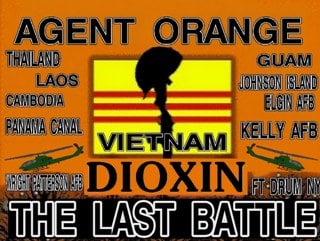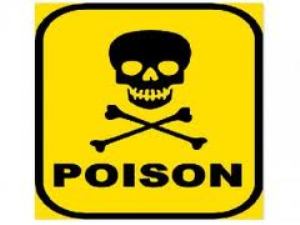
by Ed Mattson
As we recognize the 50 year anniversary marking of the Vietnam War, we still cannot shake the hangover from Agent Orange.
You’ll note I always capitalize the words Agent Orange out of the respect of this agent with caused such devastating damage to the citizens in the countries where it was manufactured, stored, used and deployed, and to the unsuspecting men, women and children who deployed, handled, or had the mishap of living in the vicinity of where it was stored and used.
The only comparable scenario that would come to mind, though minuscule by comparison, is a sexually transmitted disease that keeps on “giving”.
We have gotten pretty good at tracking down the source and those exposed to STD’s, but we just can get a hold on Agent Orange, and much of that blame is standing on the doorstep of the US Government, and it’s cohorts in crime, the chemical companies which manufactured the product.
Had the issue and all information been put on the table early-on, perhaps we could have put this issue to bed at the git-go, but with all the denials, cover-ups, mis-information, and lies, we are so far behind the old eight-ball, I am afraid this problem will go on long after most of us have departed for greener pastures.
This is not to say we have lost the battle, as those of us who refuse to let the issue die, understand we must display the same persistence and mentality of not wanting to leave a single soldier behind on the battlefield, before the final nail can be driven into the Agent Orange coffin.
The Vietnam War may be 50 years into history, but the battlefield (and those left still on it), has spread to Korea, New Zealand, Guam, Canada, Thailand, Laos, and the US, while residual battles still hang-on in Vietnam, as we deal with the aftermath.
With great effort to remain persistent, the victims of Agent Orange and the organizations that represent them, keep us all in the loop by publicizing the weekly events that help keep the issue alive. Most recently Monsanto lost a bid to close part of a lawsuit alleging the company caused health injuries to residents living near a plant that made Agent Orange. While this doesn’t directly affect the Vietnam Vet, it does bolster the claim of the long lasting effect of AO contamination.
The plant was located in Nitro, West Virginia, and was in production from 1934 to 2000. The AO production ran throughout the Vietnam War years, but normal chemical production resumed up until 2000.
In its court arguments Monsanto insisted it was working as a government contractor and therefore protected from certain claims related to its waste disposal at that facility. U.S. District Judge Paul Gardephe in New York on Wednesday rejected the company’s request for partial summary judgment based on its “government contractor defense” and said the suit, filed in 2009 by West Virginia residents, could proceed.
This is a point for the good guys, but Monsanto is not a company to give up. Monsanto spokesman, Tom Helscher claiming the problems were caused by “the Old Monsanto Company” from 40 years ago stated, and said, “we remain confident that we will prevail on the merits at the trial of this case,” Judge Gardephe cited the 2nd Circuit U.S. Court of Appeals upholding a trial court’s finding in signature Agent Orange litigation.
His decision was based on the fact that Monsanto was unable or never even tried to prove the US Government was aware that the airborne contaminants, which have cause so many health problems (by contaminating both the air and soil), was the result of Monsanto’s practice of open-pit burning of the waste product. Judge Gardephe went on to state, “there is no evidence that the U.S. government was ever aware of the alleged open pit burning practice, much less that it had evaluated the hazard posed by such a practice (open-pit burning)”.
In conclusion the judge stated, “Because defendants have not demonstrated that the complained-of activity — the open pit burning of dioxin waste at the Nitro plant — was conducted ‘pursuant to reasonably precise government specifications,’ their motion for summary judgment based on the government contractor defense must be denied.”
On another front, a couple of Congressmen, one Republican (Denny Rehmer-Montana) and the other a Democrat (Bob Filner-California), are co-sponsoring HR-812. The bill would, “clarify the definition of a Vietnam Veteran in order to extend benefits to veterans suffering from Agent Orange induced illnesses”.
In due recognition, Congressman Rehberg stated, “The men and women who bravely served their country in Vietnam have earned every bit of the care we can give them, and we shouldn’t be subjecting them to more political and bureaucratic hurdles caused by restrictive legal definitions. To Montana’s vets, I say that if you were hurt as a result of your military service, our country has an obligation – and the honor – to provide you with the care you deserve. This legislation does just that.”
“The American Legion applauds Congressman Rehberg’s efforts to ensure that the victims of Agent Orange are given the benefits they deserve,” said Tim Tetz, Director, National Legislative Commission for the American Legion. “Clearly, he hasn’t forgotten the service of our brave men and women who wore the uniform.”
Persistence is more important than ever today. We are making inroads. More than $2.2 billion in retroactive benefits has been paid to about 89,000 Vietnam War-era veterans and their survivors who filed claims related to one of three new Agent Orange presumptive conditions, according to the Department of Veterans Affairs.
On Aug. 31, 2010, VA amended its regulations to add ischemic heart disease, hairy-cell leukemia (chronic B-cell leukemias and others), and Parkinson’s disease to the list of diseases presumed to be related to exposure to Agent Orange. All potentially eligible veterans should apply as soon as possible to preserve the most favorable effective date for payments.
To those filing new claims, the VA may authorize up to one year of retroactive benefits. Eligible veterans include more than just Vietnam veterans – those who were exposed while on duty or visited Vietnam or on its inland waterways between Jan. 9, 1962, and May 7, 1975. The amended regulation also includes those service members exposed along the demilitarized zone in Korea between April 1, 1968, and Aug. 31, 1971, and those exposed to herbicide tests and storage at military bases within and outside the United States.
The website, www.fasttrack.va.gov/AOFastTrack/, makes it easy to file a claim and for the service member’s doctors to upload documents supporting the veteran’s claims. Tracking the status of a claim can also be done through this website. For more information, you can call (800) 749-8387 and press 3.
Additionally, New York Senator Kirsten Gillibrand (D) and South Carolina Senator Lindsey Graham (R) have introduced legislation to ensure that more than 250,000 Navy veterans from the Vietnam War exposed to Agent Orange will be eligible to receive the disability and health care benefits they have earned for diseases linked to Agent Orange exposure. This is in response to the never-ending battle by the Blue Water Navy, to fight for the rights of naval personnel who were exposed to AO, but were not considered “boots on the ground” in Vietnam.
Studies have shown that Agent Orange contaminated the water sources on ships, affecting veterans on-board and contaminated the aircraft that transported barrels of Agent Orange, and deployed the chemicals. A May 2011 report by the Institute of Medicine established several “plausible routes” for Agent Orange exposure through the water distillation process aboard Navy ships and through the air, and concluded there was an increased chance of developing serious heart problems and Parkinson’s disease. An earlier study by the Centers for Disease Control and Prevention (CDC) showed Vietnam veterans had a rate of non-Hodgkin’s lymphoma 50 percent higher than the general population and is linked to a range of other diseases, including several blood and respiratory cancers, type II diabetes, prostate cancer and more.
The bill being presented to the Senate has yet to be given a number but it is gaining support from both sides of Congress. As an observer, this bill, co-sponsored by Gillibrand and Graham, along the previously mentioned House bill by Rehberg and Filner, show that contrary to popular belief, “Congress is unceremoniously deadlocked and nothing ever gets done”, bills of significant importance can be accomplished with bilateral support.
I have often written that gridlock is good if it keeps the government from the runaway debt “one party rule” creates. To me it makes more sense to develop legislation that is obviously needed and not wasted on hair-brained politically motivated ideas that extend from unbridled power.

Following his service in the Marine Corps Ed Mattson built a diverse career in business in both sales/marketing and management. He is a medical research specialist and published author. His latest book is Down on Main Street: Searching for American Exceptionalism
Ed is currently Development Director of the National Guard Bureau of International Affairs-State Partnership Program, Fundraising Coordinator for the Warrior2Citizen Project, and Managing Partner of Center-Point Consultants in North Carolina.
Mr. Mattson is a noted speaker and has addressed more than 3000 audiences in 42 states and 5 foreign countries. He has been awarded the Order of the Sword by American Cancer Society, is a Rotarian Paul Harris Fellow and appeared on more than 15 radio and television talk-shows.
ATTENTION READERS
We See The World From All Sides and Want YOU To Be Fully InformedIn fact, intentional disinformation is a disgraceful scourge in media today. So to assuage any possible errant incorrect information posted herein, we strongly encourage you to seek corroboration from other non-VT sources before forming an educated opinion.
About VT - Policies & Disclosures - Comment Policy




